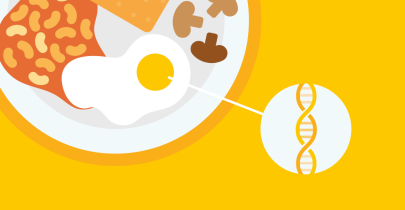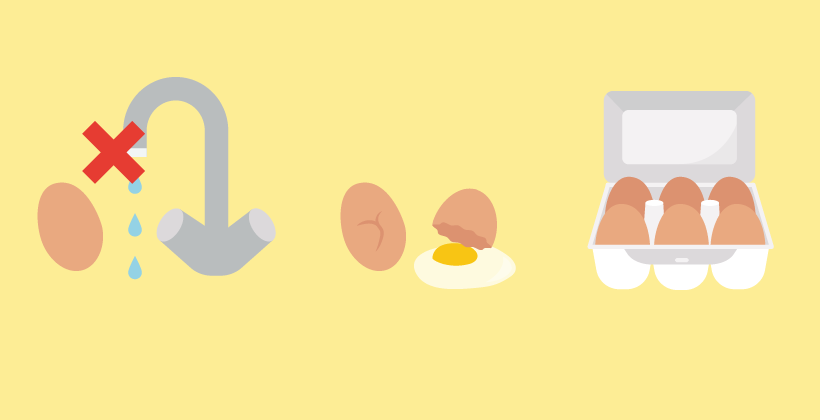In the news: Will eating 3 eggs a week increase your risk of dying young?
Last Updated : 03 March 2021Recent news stories claim that eating as much as half an egg a day could increase the risk of early death. Others say that regularly eating yolks could cause cancer, heart attacks and strokes. But before ditching the eggs, there are a few things to keep in mind.
The study behind the headlines
The recent headlines follow a new observational study, carried out in the US, looking into the link between egg and cholesterol consumption and the risk of death.1
Participants, between 50-71 years of age, were asked about their overall eating and lifestyle habits, including how frequently they’ve eaten eggs, how they’ve usually cooked them (for example fried/sauteed in oil, poached or boiled) and whether they’ve eaten the yolks.
Researchers then estimated the total cholesterol intake of each participant based on their reported diet and followed up with their health outcomes through national mortality registers over the period 1995-2011).
The results of this study suggest that, over the course of about 16 years, eating half an egg a day increased the risk of death from any cause, and particularly death from cancer or cardiovascular disease, by 7%. In turn, participants who ate only egg whites or egg substitutes were assessed to have a 7% lower risk of death from any cause.
What’s more, consuming an additional 300 mg of dietary cholesterol a day was linked to a 19% higher risk of death from any cause and a 16% higher risk of death from a cardiovascular event.
What to keep in mind when reading the study’s conclusions?
-
Observational studies can’t prove direct cause and effect.
While research in this study has taken into account various individual, health and lifestyle factors (such as age, sex, overall diet, physical activity and smoking) that could potentially influence results, it’s still difficult to ensure that these different factors had no impact on the final result. Therefore, it can’t be fully concluded that egg consumption alone increases the risk of death.
-
Estimates of egg and cholesterol intake may be inaccurate.
It’s important to consider that diet was only assessed once when the participants filled a questionnaire on their eating habits, known as the food frequency questionnaire. Potential changes in the eating habits of the participants over the years were not taken into consideration.
Also, while food frequency questionnaires are one of the best methods available to assess dietary intake, they still have limitations. For example, subjective estimates of how often and how much one eats certain foods may be inaccurate. In this study, this may lead to further inaccuracy when estimating the cholesterol consumption of each participant based on the self-reported food intake.
-
The mortality risk found for eating half an egg a day needs to be put in perspective
Eggs are good and convenient sources of protein and various other nutrients, such as choline, iron, vitamin B12 and biotin, which contribute to the good functioning of our bodies. As part of a balanced healthy diet and active lifestyle, these benefits may outweigh the potential risks of cholesterol consumption.
-
The study was done on a specific group of people who may not be representative of other populations.
This study included a group of retired US adults aged 50 to 71 years who are not representative of the entire population. Their mortality risk from egg consumption cannot be assumed to apply to younger adults or to those from other countries altogether.
What do the authorities advise?
- While there’s a scientific consensus that high intakes of saturated fat increase blood LDL cholesterol (“bad cholesterol”), the evidence is less consistent when it comes to the effect of dietary cholesterol on blood cholesterol and consequently, on the risk of cardiovascular disease.2
- WHO’s dietary guidelines recommend limiting fat intake to 30% of total daily energy and saturated fats to less than 10%, irrespective of dietary cholesterol intake, from eggs or otherwise.3
- Eggs are recommended in most national dietary guidelines, as a source of high-quality protein and important vitamins and minerals. These guidelines are updated based on sound scientific, or a new, consensus on a topic.
- If you have questions about whether or not eggs should be part of your diet, consult your doctor or a registered nutritionist/dietitian to get specific advice.
It might also interest you:
- Choline: foods, functions, how much do you need & more
- Iron: foods, functions, how much do you need & more
- Vitamin B12: foods, functions, how much do you need & more
- Biotin: foods, functions, how much do you need & more
- Dietary fats (Infographic)
References
- Zhuang P et al. (2021). Egg and cholesterol consumption and mortality from cardiovascular and different causes in the United States: A population-based cohort study. PLoS Med. 18(2): e1003508.
- EU Joint Research Centre. Health Promotion & Disease Prevention – Fats. Accessed on 24 Feb. 2021.
- World Health Organisation (WHO) (2015). Healthy Diet Factsheet No 394.

